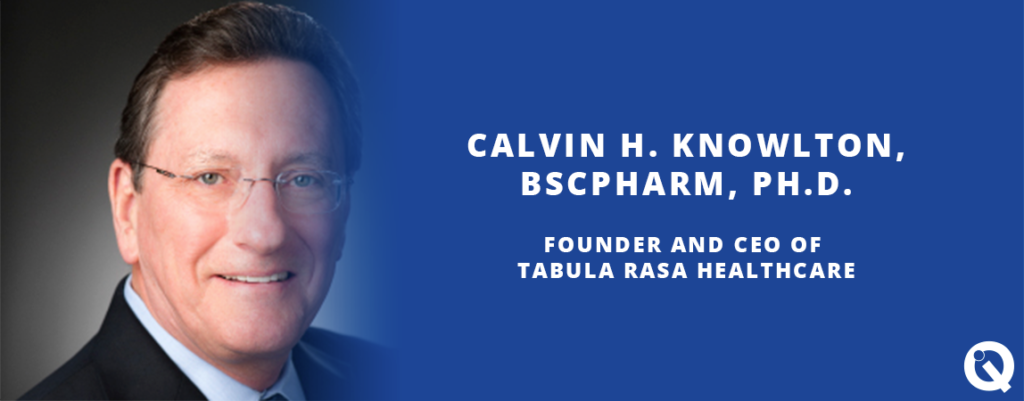Calvin H. Knowlton, BScPharm, Ph.D., is the founder and CEO of Tabula Rasa HealthCare, a long-time member of the Quality Institute’s Purchaser Council. The company provides patient-specific, data-driven technology to optimize medication regimens.
As a leader in medication safety, what have you discovered about the risk of adverse drug events associated with drugs repurposed for the treatment of COVID-19?
We looked at the medication regiments of 12,000 patients, including each person’s prescription and nonprescription drugs. We utilized our technology to determine each patient’s MedWise Risk Score™. We simulated adding five repurposed COVID-19 drugs one at a time or in combinations to patients’ existing drug regiments. They included drugs such as hydroxychloroquine, and lopinavir and ritonavir. We conducted a virtual clinical trial.
We have the only predictive, multi-drug, simultaneous analysis system in the world that we know of. We look at the genomics, kinetics, dynamics and other elements and come up logarithmically with a risk score from zero to 50. Once you get to a score of 15, your medical spend for the year is about 50 percent higher than normal.
In this study, we looked at an older group of people about 75 years old with 10 comorbidities. We found that when you add repurposed drugs for COVID you may fix COVID, but it adds a lot more risk to the patient. We didn’t give the meds to anybody. We simulated adding these drugs to analyze what would happen. And so I think it’s an eye opener.
What new technologies and solutions are being developed to address risks associated with COVID-19?
We have several studies in monitoring as it applies to medications. If you have somebody on 10 medications and they add another, you may wait 30 days or 60 days to see if they have a problem with the new drug. But with remote patient monitoring, we can pick potential problems up quicker, faster — before somebody falls and breaks a hip, for example. The remote monitoring device is like a Band-Aid you put on your chest. And it transmits to a device in your house and then comes up to the cloud and over to us. We’re able to interpret the information and see potential risk for falls, or dysrhythmia, bradycardia … things like that.
Can you tell us about the tool you created to support the CDC’s National Diabetes Prevention Program?
Our scientists have been working on this for about six years. Say somebody is taking 10 medications. All medications basically are poison — or foreign objects — and they have to become water solubilized to go to the kidneys and be excreted. Certain genes facilitate this process. These genes are like parking spaces in the intestine and the liver. So if you have three of the drugs looking for the same parking spaces, the body’s not smart enough to say, “I’m going to give each drug a third of the parking spaces.” So the drug that has the highest affinity gets into all the parking spaces, and the other drugs cannot get water solubilized — and they’re running around the body at full speed. The rest of the story surrounds the about 7 percent of drugs that need a two-step dance — one gene to activate them and another to water-solubilize them.
We found that certain diseases, for example, diabetes, down-regulate some of these same genes that are used to activate or water solubilize, or metabolize, drugs. Now we understand why some drugs just don’t work in people with diabetes — or work too much. Diabetes and other diseases exhibiting chronic low-grade inflammation have a tendency to down-regulate drug-metabolizing genes, which unfortunately leads to either no activation of the drug or unintentional higher than expected drug levels in the body.
Our work is pretty breakthrough. And that’s where we think we can help the care of diabetes, on the drug side, to be more targeted.
How have you worked with community pharmacies to support their ability to provide COVID-19 testing?
We’re working with 10,000 independent pharmacists and small chains to distribute COVID-19 tests. So far we have facilitated about 15,000 test kits. We have connections with the labs that do the testing.
We like to learn something about our experts beyond their work. Your wife Orsula V. Knowlton, PharmD, MBA, is a co-founder of Tabula Rasa. Where might we find you both on a day off?
We have a blended family, so we have eight kids all together. Frequently we’ll play golf. We don’t keep score and often play best-ball, because we have enough stress and competition in our regular lives. All the children play golf. Some are really good. Most of us are not, but we get out there and it’s meaningful time together.

